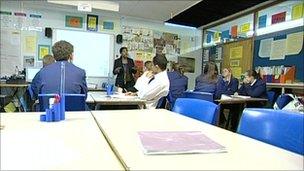Scottish teachers' working conditions under threat
- Published

Cosla said the need for change was being driven by budget constraints and a new curriculum
Scottish teachers' working conditions could be radically changed under a shake-up proposed in a document from Cosla, obtained by BBC Scotland.
The council body's report outlined plans which could cut holidays, end a 35-hour week and threaten job security.
The government-commissioned submission, based on council responses, said budget cuts and the new Curriculum for Excellence meant changes were needed.
Union leader Ronnie Smith described the submission as "madness".
Cosla has subsequently released a new statement indicating that it may amend its proposals - even though the deadline for submissions to the McCormac review has now passed.
Making the case for change, Cosla said the landmark McCrone deal 10 years ago - which gave teachers a pay rise of 23% over three years - lead to peaceful industrial relations, but a "less clear cut" impact on children's achievement and attainment.
'Licence to teach'
In the submission, it raised the prospect of more teachers being barred from the profession.
It said consideration should be given to the satisfactory completion of training courses, which are essential for the new "re-accreditation" requirement of the General Teaching Council of Scotland - in what has been dubbed "a licence to teach".
Cosla proposed a closer relationship between the standards reached by teachers and their pay and conditions. Currently pay rises are largely linked to time served or promotion.
Emphasising the importance of high performance among head teachers, it said there was a case for them being on renewable rather than permanent contracts.
It also proposed short, fixed-term contracts, subject to appraisal, for promoted posts below head teacher level. And it suggested these teachers should move between different schools so that future leaders acquired a broad range of experience.
Calling for further flexibility, it said there was even a case for primary head teachers graduating to become secondary heads.
'Off the wall'
Cosla said a compelling reason for moving in-service training centre stage, was the radically new Curriculum for Excellence, external which required teachers to make up their own lessons rather than following detailed national guidelines.
The document indicated the number of in-service days could increase from the current five a year, and they could take place during pupils' holidays.
It said the current system was too disruptive to pupils and required hard-pressed councils to pay for temporary staff.
Asserting that "counting hours" was inappropriate for professionals, Cosla proposed moving from a 35-hour week to a more flexible model of about 140 hours a month.
It also called for an end to primary teachers spending a maximum 22.5 hours a week teaching in the classroom (to provide time for preparing and marking) because of the additional expense of paying for cover staff.
It said the amount of time secondary teachers spend in the classroom should also be examined.
Ronnie Smith, general secretary of the EIS teaching union, described the submission as "a stream of consciousness - some of it quite off the wall".
He added: "If they try to do things like extend teachers' working year they're going to hit a brick wall.
"They have some of the longest working hours in Europe and they've already been hit by issues such as a two-year pay freeze and a 50% increase in pension contributions."
He said the call for flexible working seemed to mean "work all the hours God sends, at the hours we want you to".
'Best value'
Ann Ballinger, general secretary of the Scottish Secondary Teachers Association union, said: "I have never had confidence in the assurances we've been given by negotiators but this just proves my lack of confidence in their integrity was justified.
"Clearly the people who wrote this know a bit about education, but large parts of it are complete nonsense and will make teachers very angry."
Cosla said the government-commissioned review of the McCrone deal, external, being carried out by Stirling University principal Prof Gerry McCormac, should be viewed as an opportunity to be as radical in 2011 as McCrone was in 2001.
It said an expected hole of £3.8bn in public sector spending by the year 2016/17 brought "even more urgency to the need to ensure best value and to scrutinise all elements of workforce management".
Currently about £5bn a year is spent on education - most of it on staff.
Justifying change Cosla said: "In this new time of austerity our watch-words are affordability and sustainability. Business as usual is therefore not an option."
A Scottish Government spokesman said: "Much has changed since the current agreement on teacher employment was introduced 10 years ago.
"The McCormac review is looking at a range of issues including whether the agreement is delivering all the benefits intended for both teachers and pupils, is suited to the delivery of Curriculum for Excellence and attracts the most-talented people into the profession.
"Professor McCormac will undoubtedly consider all submissions over the course of the group's work."
- Published28 April 2011
- Published28 March 2011
- Published28 January 2011
- Published21 February 2011